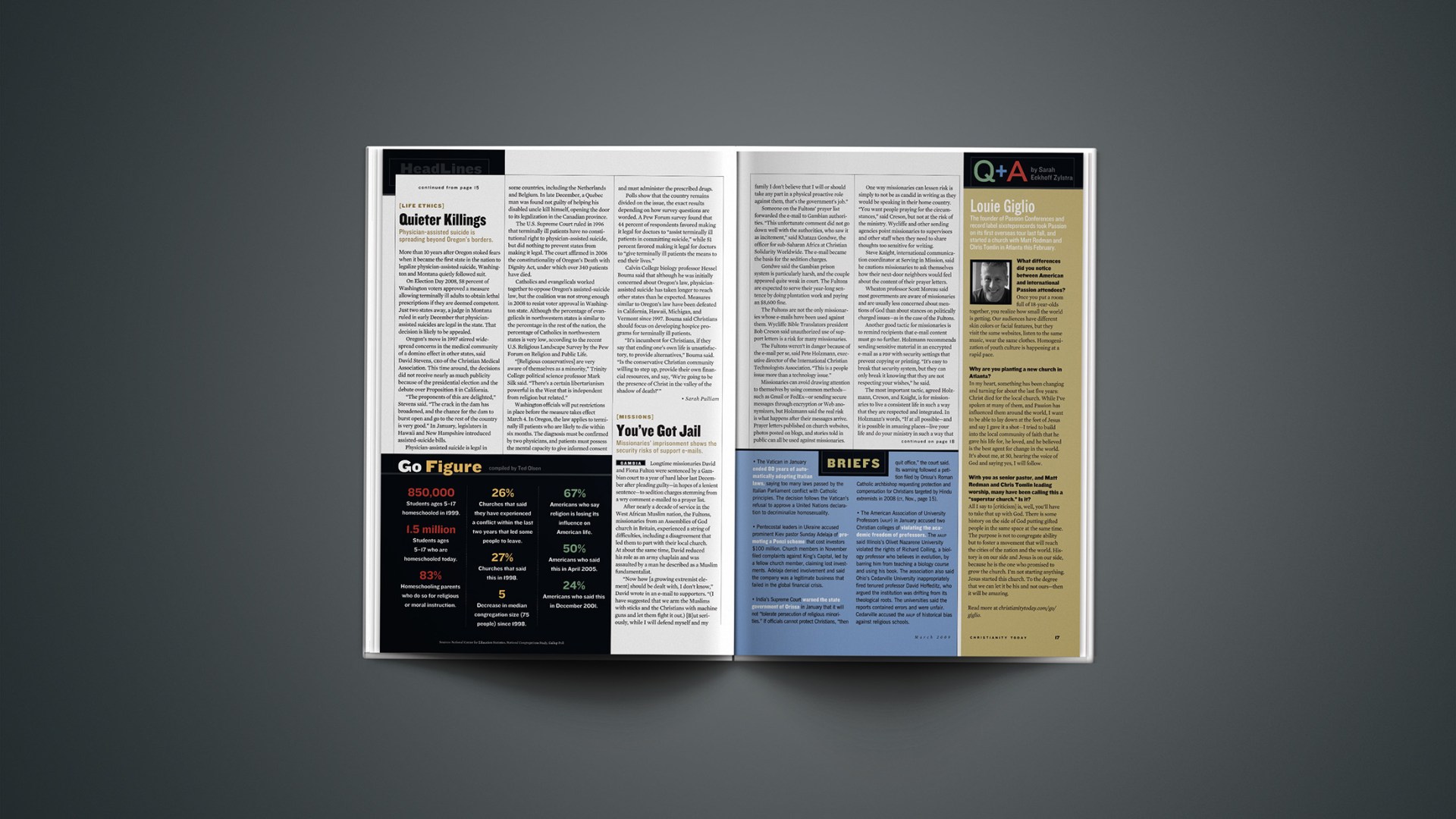More than 10 years after Oregon stoked fears when it became the first state in the nation to legalize physician-assisted suicide, Washington and Montana quietly followed suit in late 2008.
On Election Day, 58 percent of Washington voters approved a measure allowing terminally ill adults to obtain lethal prescriptions if they are deemed competent. Just two states away, a judge in Montana ruled in early December that physician-assisted suicides are legal in the state. That decision is likely to be appealed.
Oregon’s move in 1997 stirred widespread concerns in the medical community of a domino effect in other states, said David Stevens, CEO of the Christian Medical Association. This time around, the decisions did not receive nearly as much publicity because of the presidential election and the debate over Proposition 8 in California.
“The proponents of this are delighted,” Stevens said. “The crack in the dam has broadened, and the chance for the dam to burst open and go to the rest of the country is very good.” In January, legislatures in Hawaii and New Hampshire introduced assisted-suicide bills.
Physician-assisted suicide is legal in some countries, including the Netherlands and Belgium. In late December, a Quebec man was found not guilty of helping his disabled uncle kill himself, opening the door to its legalization in the Canadian province.
The U.S. Supreme Court ruled in 1996 that terminally ill patients have no constitutional right to physician-assisted suicide, but did nothing to prevent states from making it legal. The court affirmed in 2006 the constitutionality of Oregon’s Death with Dignity Act, under which over 340 patients have died.
Catholics and evangelicals worked together to oppose Oregon’s assisted-suicide law, but the coalition was not strong enough in 2008 to resist voter approval in Washington state. Although the percentage of evangelicals in northwestern states is similar to the percentage in the rest of the nation, the percentage of Catholics in northwestern states is very low, according to the recent U.S. Religious Landscape Survey by the Pew Forum on Religion and Public Life.
“[Religious conservatives] are very aware of themselves as a minority,” Trinity
College political science professor Mark Silk said. “There’s a certain libertarianism powerful in the West that is independent from religion but related.”
Washington officials will put restrictions in place before the measure takes effect
March 4. In Oregon, the law applies to terminally ill patients who are likely to die within six months. The diagnosis must be confirmed by two physicians, and patients must possess the mental capacity to give informed consent and must administer the prescribed drugs.
Polls show that the country remains divided on the issue, the exact results depending on how survey questions are worded. A Pew Forum survey found that 44 percent of respondents favored making it legal for doctors to “assist terminally ill patients in committing suicide,” while 51 percent favored making it legal for doctors to “give terminally ill patients the means to end their lives.”
Calvin College biology professor Hessel Bouma said that although he was initially
concerned about Oregon’s law, physician-assisted suicide has taken longer to reach other states than he expected. Measures similar to Oregon’s law have been defeated in California, Hawaii, Michigan, and Vermont since 1997. Bouma said Christians should focus on developing hospice programs for terminally ill patients.
“It’s incumbent for Christians, if they say that ending one’s own life is unsatisfactory, to provide alternatives,” Bouma said. “Is the conservative Christian community willing to step up, provide their own financial resources, and say, ‘We’re going to be the presence of Christ in the valley of the shadow of death?’ “
Copyright © 2009 Christianity Today. Click for reprint information.
Related Elsewhere:
More Christianity Today articles about suicide are in our Life Ethics section, including:
Physician-Assisted Suicide Bill Dies in Hawaii Senate | If passed, Hawaii would have joined Oregon as the only states with such laws. (May 03, 2002)
Suicide — A Preventable Tragedy? | A ministry helps churches handle the complex issue. (July 6, 2000)
CT Classic: Suicide and the Silence of Scripture | Though the church has come to opposing conclusions about the fate of victims, we have a mandate to minister to those left behind. (July 6, 2000)
Is Suicide Unforgivable? | What is the biblical hope and comfort we can offer a suicide victim’s family and friends? (July 6, 2000)










